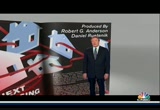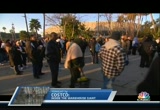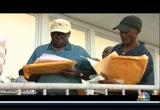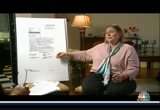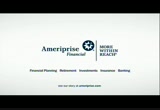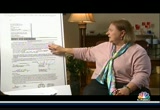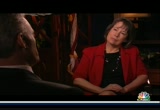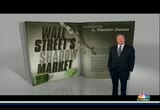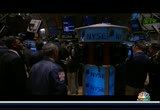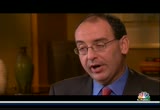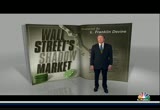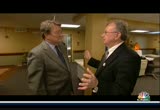tv 60 Minutes on CNBC CNBC November 22, 2012 1:00pm-2:00pm EST
1:00 pm
i'm morley safer. thanks for joining us. [ticking] >> banks were filing foreclosure lawsuits by the millions, and in the rush to collect, it appeared some financial firms were using phony legal documents to throw people out of their homes. chris pendley says he forged 4,000 bogus mortgage documents a day for major u.s. banks. and your previous experience in banking? >> none. [ticking] >> it started out as a mortgage crisis. then it slowly evolved into a credit crisis. now it's something entirely different and much more serious. >> this is a full-blown financial storm and one that comes around perhaps one every
1:01 pm
50 or 100 years. this is the real thing. >> and much of what went wrong on wall street could be traced back to something called "credit default swaps." they were traded in a risky shadow market, and they were at the heart of the financial meltdown. [ticking] >> it has tentacles as wide as anything i've seen. i think, next to housing, this is the single most important issue in the united states and certainly the largest threat to the u.s. economy. >> meredith whitney was talking back in 2010 about a then- looming financial crisis involving state and local governments across the country. it was a debt crisis which some people believe could derail the recovery and require another big bailout package that no one in washington wants to talk about. >> the day of reckoning has arrived. that's it. and it's gonna arrive everywhere. time may vary a little bit depending upon which state you're in, but it's coming. [ticking] >> welcome to 60 minutes on cnbc.
1:02 pm
i'm steve kroft. in this edition, we look at three stories linked by the financial collapse of 2008. first, we examine a scam that's cost thousands of americans their homes. then we look into wall street's shadow market of credit default swaps. finally, a report on the perilous state of state finances. we begin with the foreclosure crisis. in the aftermath of the great recession, the huge number of foreclosed properties was a significant factor in weighing down the economy. many were stuck on the market for an unexpected reason: the banks couldn't find the ownership documents. as scott pelley first reported in april 2011, lenders wanting to evict people found that often, the legal documents behind the mortgages simply weren't there. caught in a jam of their own making, some companies appeared to have resorted to forgery to throw people down on their luck out of their homes.
1:03 pm
>> these folks on the street aren't homeless. they slept on the sidewalk because they want to keep their homes. facing foreclosure, they camped out to get in line to beg their bank for lower payments on their mortgage. so many in the country are desperate now that they have to meet in convention centers coast to coast. >> we understand people have been here for a day or two. >> two. >> two. >> for two days. >> two and a half. >> this was los angeles, where 37,000 homeowners gathered. and this was miami, where the worry was visible and shared by 12,000 more. the line went down the block and doubled back twice. dale defreitas lost her job. now she fears her home is next. >> it's very emotional, because i just think about, "i don't want to lose my home." i really don't. >> it's your american dream. >> it was. and it still is. [chuckles] >> welcome to naca, "save the dream." welcome, everybody.
1:04 pm
>> these convention center events are put on by the nonprofit neighborhood assistance corporation of america, which helps people figure out what they can afford and then walks them across the hall to bank representatives to ask for lower payments. more than half will get their mortgages adjusted, but the rest discover that they just can't keep their home. and for many, that's when the real surprise comes in. turns out, these banks, which demand borrowers have all of their paperwork just right, these same banks have fouled up their own paperwork to a historic degree. >> in my mind, this is an absolute intentional fraud. >> lynn szymoniak is fighting foreclosure, and while trying to save her house, she discovered something we did not know. back when wall street was using algorithms and computers to engineer those disastrous mortgage-backed securities, it appears they didn't want old-fashioned paperwork slowing
1:05 pm
down the profits. this was back when it was a white-hot fever pitch to move as many of these as possible. >> when you could make a whole lot of money through securitization and every other aspect of it could be done electronically, you know, keystrokes, this was the only piece where somebody was supposed to actually go get documents, transfer the documents from one entity to the other. and it looks very much like they just eliminated that step altogether. >> szymoniak's mortgage had been bundled with thousands of others into one of those wall street securities traded from investor to investor. when the bank took szymoniak to court, it first said that it had lost her documents, including the critical assignment of mortgage, which transfers ownership. but then there was a courthouse surprise. they found all of your paperwork more than a year after they initially said that they had lost it? >> yes. >> did that seem suspicious to you? >> yes, absolutely. you know, and what do you imagine, it fell behind the file
1:06 pm
cabinet? where was all of this? we had it. we own it. we lost it. and then, more recently, everyone is coming in saying, "hey, we found it. isn't that wonderful?" >> but what the bank may not have known is, lynn szymoniak is a lawyer and fraud investigator with a specialty in forged documents. she has trained fbi agents. did you ask for copies of those documents? >> yes. >> and what did you find? >> when i looked at the assignment of mortgage, and this is the assignment, a copy from my case, i looked at even the date they put in, which was 10/17/2008, was several months after they sued me for foreclosure. so what they were saying to the court was, "we sued her in july of 2008, and we acquired this mortgage in october of 2008." it made absolutely no sense. >> curious, she used her legal training to go online and researched 10,000 mortgages.
1:07 pm
>> then i began to find the strange signatures. >> one of the strangest signatures belonged to the bank vice president who'd signed szymoniak's newly discovered mortgage documents. the name is linda green, but on thousands of other mortgages, the style of green's signature changed a lot, and even more remarkable, szymoniak found that linda green was vice president of 20 banks all at the same time. >> all within the same week. i mean, this is a very, very active person. >> where did all those documents come from? we went searching for the linda green, and we found her in rural georgia. she told us she's never been a bank vice president. in 2003, she was a shipping clerk for auto parts when her grandson told her about a job at a company called docx, d-o-c-x. docx, once housed here in alpharetta, georgia, was a sweatshop for forged mortgage
1:08 pm
documents. >> they were sitting in a room signing their name as fast as they possibly could to any kind of nonsense document that was put in front of them. [ticking] >> coming up, more linda greens. >> so you're linda green? >> yes. can't you tell? [laughs] >> it's easy being green, when 60 minutes on cnbc returns. americans believe they should be in charge of their own future. how they'll live tomorrow.
1:09 pm
for more than 116 years, ameriprise financial has worked for their clients' futures. helping millions of americans retire on their terms. when they want. where they want. doing what they want. ameriprise. the strength of a leader in retirement planning. the heart of 10,000 advisors working with you one-to-one. together for your future. ♪ what starts with adding a friend... ♪ ...could end with adding a close friend. the lexus december to remember sales event is on. this is the pursuit of perfection. the lexus december to remember sales event is on. if we want to improve our schools... ... what should we invest in? maybe new buildings? what about updated equipment? they can help, but recent research shows... ... nothing transforms schools like investing
1:10 pm
1:11 pm
>> in the aftermath of the 2008 housing collapse, the number of properties going into foreclosure soared across america. but in a shocking number of cases, many of the mortgage documents needed for the banks to foreclose on delinquent homeowners were missing. as scott pelley reported in april of 2011, this led some companies to set up forgery mills to re-create the missing paperwork. >> docx and companies like it were re-creating missing
1:12 pm
mortgage assignments for the banks and providing the legally required signatures of bank vice presidents and notaries. linda green says she was named a bank vice president by docx because her name was short and easy to spell. as demand exploded, docx needed more linda greens. so you're linda green? >> yes. can't you tell? [laughs] >> chris pendley worked at docx at the same time and signed as linda green. when you came in to docx on your first day, what did they tell you your job was gonna be? >> that i was gonna be signing documents using someone else's name. >> did you think there was something strange about that in the beginning? >> yeah, it seemed a little strange, but they told us and they repeatedly told us that everything was aboveboard and it was legal. >> and your previous experience in banking? >> none. >> in legal documents? >> none. >> there really were no
1:13 pm
requirements for the job. >> correct. >> you had to be able to hold a pen. >> hold a pen. >> but you were signing these documents as if you were an officer of the bank. >> correct. >> how many banks were you vice president of in a given day? >> i would guess somewhere around five to six. >> what were you getting paid for this? >> [chuckles] i'm embarrassed to say. $10 an hour. >> $10 an hour, that's not much for a guy who's vice president of five banks. >> yeah, i was very underpaid for my status in the companies. >> pendley showed us how he signed mortgage documents as linda green. he told us that docx employees had to sign at least 350 an hour. pendley estimates that he alone did 4,000 a day. >> [laughs] >> this is also linda green. shawanna crite worked at docx and says that she both signed and notarized the mortgage documents. what was the role of the notary? >> we were to make sure that everyone on the document was who they said they were and
1:14 pm
notarize the documents. >> but the people who were signing the documents weren't who they said they were. >> right. >> so if chris pendley was signing for linda green, you'd notarize that document? >> yes. >> and you were told that was okay? >> yes. >> the real linda green didn't want to be interviewed, but she said that some of the bank vice presidents at docx were high school kids. their signatures were entered into evidence in untold thousands of foreclose suits that sent families packing. >> so it was a common practice in the last few years to flood the courts with these documents. >> and look at some of the junk the courts were flooded with. sometimes, the document mill didn't even bother to fill in the name of the supposed owners. to them, it seemed like a joke. >> instead of the name of the bank here that was acquiring the loan, this one says, "bogus assignee for intervening
1:15 pm
assignments." that's who acquired this loan. >> this was an actual document that was in litigation? >> yes. and what corporation assigned this loan? a corporate identified as "a bad bene." excuse me? when i saw that, i was just absolutely amazed. >> what does that mean, a bad bene? >> it could possibly mean "a bad beneficiary." i have no idea what they meant. so here's the same woman, linda green, and this time, instead of being a vice president of american home mortgage servicing, she's vice president of a bad bene. >> szymoniak says that the banks whose paperwork was handled by the docx forgery mill included wells fargo, hsbc, deutsche bank, citibank, u.s. bank, and bank of america. we contacted all of them, and each said that it farmed out its mortgage servicing work to other companies, and it was those mortgage servicing firms that
1:16 pm
hired docx. docx was owned by a company called lps, a $2 billion firm that calls itself the nation's leading provider of mortgage processing services. lps told us that when it found out about the phony signatures in 2009, it shut docx down. >> it's astonishing to me that this became as pervasive as a problem that it is. >> it got sloppy. >> it got very sloppy. >> until july 2011, sheila bair was one of the government's top banking regulators as chairman of the federal deposit insurance corporation. you just described it as pervasive. >> yeah. it is pervasive. it absolutely is pervasive. and it was just a matter of cutting corners, not spending enough money, not have any quality controls. >> although banks say the courts have been accepting their paperwork, that's changing as desperate homeowners countersue the banks over the document fiasco. this leaves houses unsold indefinitely, undermining the recovery. >> i'm very worried about, if
1:17 pm
this starts getting out of hand, the kind of impact it will have. >> these are lawsuits by homeowners... >> yes. >> who are being foreclosed upon saying-- >> or are in the process or have already been foreclosed on. >> saying, "prove it." >> yes, exactly. >> "prove that you own this." >> exactly. >> chairman bair thinks rotten mortgage documents are so threatening to the economy that the government should force banks to pay into a massive fund. but you think there needs to be a cleanup fund... >> i do. a cleanup fund's a good word for it. >> just like you would have for a natural disaster. >> yes, somewhat like that. yes, this is one of human making, but yes. [chuckles] >> you don't want to give an exact dollar amount for this cleanup fund, but what are we talking about? is it billions? >> it would be. yes, i would assume it would be billions, yes. >> billions of dollars. >> yes, absolutely. >> chairman bair's proposed cleanup fund would pay homeowners to accept a bank's ownership claim without a lawsuit. she says that this could be cheaper for the banks than trying to re-create the missing documents legitimately and not through the document mills.
1:18 pm
>> i think eventually, the bank could prove who owned it, but it would take a lot of time and expense. >> you know, none of the major banks were willing to sit down with us and talk to us about this, not even the american bankers association. >> oh, i'm sorry to hear that. >> why do you think that is? >> they're feeling very defensive now, and so, like, i can only assume that that is the reason why they declined. >> the banks are defensive because all 50 state attorneys general want to punish them. the states are seeking about $20 billion in damages for what they say is the irresponsible, perhaps criminal way that some mortgage companies handled what is, for most folks, the most important investment of their lives. >> in march 2012, the us government, 49 state attorneys general, and the nation's five largest mortgage lenders announced a $25 billion agreement over alleged foreclosure abuses and asked a federal judge to approve the plan. as part of that settlement, lynn
1:19 pm
szymoniak, who filed a whistle-blower lawsuit on behalf of the federal government, will receive $18 million. [ticking] coming up, the complex financial instrument that helped down the u.s. economy. >> the idea that you could lend money to someone who couldn't pay it back is not an inherently attractive idea to the layman, right? however, it seemed to fly with people who were making $10 million a year. >> wall street's shadow market when 60 minutes on cnbc returns. restore revive rejuvenate rebuild rebuild rebuild
1:20 pm
so uh this is my friend frank and his, uh, retirement plan. one golden crown. come on frank how long have we known each other? go to e-trade. they got killer tools man. they'll help you nail a retirement plan that's fierce. two golden crowns. you realize the odds of winning are the same as being mauled by a polar bear and a regular bear in the same day? frank! oh wow, you didn't win? i wanna show you something... it's my shocked face. [ gasps ] ♪ [ male announcer ] get a retirement plan that works at e-trade.
1:21 pm
[ male announcer ] get a retirement plan that works customer erin swenson bought so, i'm happy. today. sales go up... i'm happy. it went out today... i'm happy. what if she's not home? (together) she won't be happy. use ups! she can get a text alert, reroute... even reschedule her package. it's ups my choice. are you happy? i'm happy. i'm happy. i'm happy. i'm happy. i'm happy. happy. happy. happy. happy. (together) happy. i love logistics. time for citi price rewind. because your daughter really wants that pink castle thing. and you really don't want to pay more than you have to.
1:22 pm
only citi price rewind automatically searches for the lowest price. and if it finds one, you get refunded the difference. just use your citi card and register your purchase online. have a super sparkly day! ok. [ male announcer ] now all you need is a magic carriage. citi price rewind. buy now. save later. thank you, mr. speaker, uh, members of congress. in celebration of over 75 years of our government employees insurance company, or geico...as most of you know members it.congress. ...i propose savings for everyone! i'm talking hundreds here... and furthermore.. newscaster:breaking news. the gecko is demanding free pudding. and political parties that are actual parties!? with cake! and presents! ah, that was good. too bad nobody could hear me. geico. fifteen minutes could save you fifteen percent or more on car insurance. [ticking] >> in october 2008, with the financial system on the verge of
1:23 pm
collapse, president george w. bush signed into law a rescue package in which american taxpayers bought up wall street's bad investments. the numbers were staggering, but they didn't begin to explain the greed and the incompetence that created the mess. as we first reported that same week, it all began with a terrible bet, one that was magnified by reckless borrowing, complex securities, and a vast unregulated shadow market worth nearly $60 trillion that had hid the risks until it was too late to do anything about them. it started out as a mortgage crisis. then it slowly evolved into a credit crisis. now it's something entirely different and much more serious. what kind of a crisis is it today? >> this is a full-blown financial storm and one that comes around perhaps one every 50 or 100 years. this is the real thing.
1:24 pm
>> jim grant is the editor of grant's interest rate observer and one of the country's foremost experts on credit markets. he says it didn't have to happen... [bell ringing] that this disaster was created entirely by wall street itself during a time of relative prosperity. and they did it by placing a $1 trillion bet with mostly borrowed money that the riskiest mortgages in the country could be turned into gold-plated investments. if you look at how this started, with the subprime crisis, it doesn't seem to be a good bet to put your money behind the idea that people with the lowest income and the poorest credit ratings are gonna be able to pay off their mortgages. >> the idea that you could lend money to someone who couldn't pay it back is not an inherently attractive idea to the layman, right? however, it seemed to fly with people who were making $10 million a year. >> with clients clamoring for safe investments with above- average return, the big wall street investment houses bought up millions of the least
1:25 pm
dependable mortgages, chopped them up into tiny bits and pieces, and repackaged them as exotic investment securities that hardly anyone could understand. this is actually the security. >> this is the selling document for the security. >> we looked at one of them with frank partnoy, a former derivatives broker and corporate securities attorney who now teaches law at the university of san diego. >> it's hundreds and hundreds of pages of very small print with a lot of detail here. >> think anybody ever read this stuff? >> i doubt very many people read it. >> these complex financial instruments were actually designed by mathematicians and physicists who used algorithms and computer models to reconstitute the unreliable loans in ways that were supposed to eliminate most of the risk. >> obviously, they turned out to be wrong. >> why? >> because you can't model human behavior with math. >> how much of this catastrophe had to do with the instruments that wall street created and chose to buy and sell?
1:26 pm
>> the instruments themselves are at the heart of this mess. they are complex, in effect, mortgage science projects devised by these nobel-track physicists who came to work on wall street for the very purpose of creating complex instruments with all manner of detailed protocols on who gets paid when and how much. and the complexity of these structures is at the very center of the crisis of credit today. >> people don't know what they're made up of, how they're gonna behave. >> right. >> but it didn't stop the rating agencies like standard & poor's and moody's from certifying the dodgy securities' investment grade, and it didn't stop wall street from making billions selling them to banks, pension funds, and other institutional investors all over the world. but that was just the beginning of the crisis. what most people outside of wall street and washington don't know is that a lot of the people who bought these risky mortgage securities also went out and
1:27 pm
bought even more arcane investments that wall street was peddling called credit default swaps, and they've turned out to be a much bigger problem. they are private and largely undisclosed contracts that mortgage investors entered into to protect themselves in case their investments went bad, part of a huge unregulated market that's multiplied the losses. they've already helped bring down three of the biggest firms on wall street and threatened the ones that are left. but before your eyes glaze over, michael greenberger, a law professor at the university of maryland and a former director of trading and markets for the commodities futures trading commission, says they're much simpler than they sound. what is a credit default swap? >> a credit default swap is a contract between two people, one of whom is giving insurance to the other that he will be paid in the event that a financial institution or a financial instrument fails.
1:28 pm
>> so it's an insurance contract? >> it is an insurance contract, but they've been very careful not to call it that, because if it were insurance, it would be regulated. so they use a magic substitute word called a "swap," which, by virtue of federal law, is deregulated. >> so anybody who was nervous about buying these mortgage-backed securities, these cdos, they would be sold a credit default swap as sort of an insurance policy? >> a credit default swap was available to them, marketed to them as a risk-saving device for buying a risky financial instrument. >> but there was a problem. >> oh, there was a big problem. >> what was the problem? >> well, the problem was that if it were insurance or called what it really is, the person who sold the policy would have to have capital reserves to be able to pay in the case the insurance was called upon or triggered.
1:29 pm
but because it was a "swap" and not insurance, there was no requirement that adequate capital reserves be put to the side. >> now, who was selling these credit default swaps? >> bear stearns was selling them. lehman brothers was selling them. aig was selling them. you know, the names we hear that are in trouble--citigroup was selling them. >> these investment banks were not only selling the securities that turned out to be terrible investments; they were selling insurance on them? >> well, it made it easier to sell the terrible investments if you could convince the buyer that not only were they gonna get the investment but insurance. [ticking] >> coming up, defending credit default swaps. >> these people understand the nature of these products. they understand-- >> well, obviously, they didn't, or they wouldn't have bought them. they wouldn't have used them. that's ahead when 60 minutes on cnbc returns. [ abdul-rashid ] i've been working since i was about 16.
1:30 pm
1:31 pm
"i'm done. i'm out of here." you know, it's like it just hits you fast. you know, you start thinking about what's really important here. ♪ ♪ governor of getting it done. you know how to dance... with a deadline. and you...rent from national. because only national lets you choose any car in the aisle... and go. you can even take a full-size or above, and still pay the mid-size price. this is awesome. [ male announcer ] yes, it is, business pro. yes, it is. go national. go like a pro. [ engine revs ] ♪ ♪
1:32 pm
1:33 pm
>> credit default swaps are private unregulated contracts that mortgage investors entered into to insure themselves against losses in the event their investments went bad. but as we reported in october 2008, when homeowners began defaulting on their mortgages, wall street's high-risk mortgage-backed securities also began to fail, and the big investment houses and insurance companies who sold the credit default swaps hadn't set aside enough money to insure all of those losses. bear stearns was the first to go under, selling itself to j.p. morgan for pennies on the
1:34 pm
dollar. then lehman brothers declared bankruptcy. and when aig, the nation's largest insurer, couldn't cover its bad debts, the government stepped in with an $85 billion rescue. what role did the credit default swaps play in this financial disaster? >> they were the centerpiece, really. that's why the banks lost all the money. they lost all the money based on those side bets based on mortgages. >> and the market's totally unregulated. >> and this market is almost entirely unregulated. >> the result is a huge shadow market that may control our financial destiny, and yet the details of these private insurance contracts are hidden from the public, from stockholders, and from federal regulators. no one knows what they cover, who owns them, or whether or not they have the money to pay them off. one of the few sources of information is the international swaps and derivatives association, a trade organization made up of the largest financial institutions in the world. many of them are the very same
1:35 pm
companies that created the vast shadow market, lobbied to keep it unregulated, and are now drowning there because of unanticipated risks. the ceo, robert pickel, says there's nothing wrong with credit default swaps. the problem was the underlying mortgage securities. well, there's clearly something wrong wrong with the system if all of these leveraged bets, hidden leveraged bets, caused a collapse in the financial system. >> it is something that we all need to look at and learn lessons from, and we all need to work together to understand that and design a structure in the future that works more effectively. >> my point is, the people that made these mistakes are the people you represent in your organization, and many of them sit on the board. >> mm-hmm. >> i mean, if they didn't get it right, who would? >> these people understand the nature of these products.
1:36 pm
they understand-- >> well, obviously, they didn't, or they wouldn't have bought them. they wouldn't have used them. >> these are very useful transactions, and people do understand the nature of the risk that they're entering into. but i'm not sure that-- >> if they're so useful, how come they brought down the financial system? >> because perhaps they didn't understand the underlying risk in-- nobody really saw the effects that were going to flow through from the subprime lending situation. >> we wouldn't be in any of this trouble right now if we had just had underlying investments in mortgages. we wouldn't be in any trouble right now. >> it's all the side bets. >> it's the side bets. >> you've got all these big wall street firms, bear stearns, lehman brothers. you got insurance companies like aig. merrill lost a ton of money on this. everybody's lost a ton of money. they're supposed to be the smartest investors in the world, and they did it themselves. >> they did it all on their own. that's the most incredible thing about this crisis, is that they pushed the button themselves.
1:37 pm
they blew themselves up. >> now, how much of this was just incompetence on the part of wall street, the people who ran it? >> the truth is that on wall street, a lot of people just weren't very good at their jobs. it's as simple as that. >> these people were being paid $50 million to $100 million a year, some of them, the guys that were running the places. >> there is no defending-- a trainee making $45,000 a year would have had the common sense not to bet the firm on mortgage contraptions that no one in the firm actually understood. that is not a deep point to comprehend. somehow, through, i will call it a criminal neglect and incompetence, the people at the top of these firms chose to look away, to take more risk, to enrich themselves, and to put the shareholders and, indeed, the country itself, ultimately, the country's economy at risk, and it is truly not only a shame; it's a crime.
1:38 pm
>> since our report first aired, congress has passed the dodd-frank act. that legislation passed in 2010 aimed to overhaul many of the wall street practices that caused the financial collapse. as part of the dodd-frank bill, the s.e.c. and the commodities futures trading commission imposed new regulations on companies that deal extensively in derivative products. as a result of that action, credit default swaps now clear through exchanges or clearing houses, but they're still exempt from insurance regulatory oversight. [ticking] coming up, the harsh reality of state finances. the state's a deadbeat. >> yeah, i mean, the state of illinois is known as a deadbeat state. you know, this is a reputation that has taken us years to earn, and we've reached, you know, the heights of, i think, becoming the worst in the country. >> it's the day of reckoning when 60 minutes on cnbc returns.
1:39 pm
americans believe they should be in charge of their own future. how they'll live tomorrow. for more than 116 years, ameriprise financial has worked for their clients' futures. helping millions of americans retire on their terms. when they want. where they want. doing what they want. ameriprise. the strength of a leader in retirement planning. the heart of 10,000 advisors working with you one-to-one.
1:40 pm
together for your future. ♪ together for your future. try running four.ning a restaurant is hard, fortunately we've got ink. it gives us 5x the rewards on our internet, phone charges and cable, plus at office supply stores. rewards we put right back into our business. this is the only thing we've ever wanted to do and ink helps us do it. make your mark with ink from chase.
1:42 pm
>> in the wake of the 2008 financial crisis, the size of the federal budget deficit has received a lot of attention. but state and local governments are also dealing with massive deficits. each state has a slightly different story, but across the country, there is a common theme. in many state houses,
1:43 pm
expenditures are outpacing income, and public pension obligations are drastically underfunded. as we reported in december 2010, some believe a day of reckoning is at hand for many states that could require another big bailout package. >> the most alarming thing about the state issue is the level of complacency. >> meredith whitney is one of the most respected financial analysts on wall street. she made her reputation by warning that the big banks were in big trouble long before the 2008 collapse. now she's warning about a financial meltdown in state and local governments. >> it has tentacles as wide as anything i've seen. i think, next to housing, this is the single most important issue in the united states and certainly the largest threat to the u.s. economy. >> why aren't people paying attention? >> 'cause they don't pay attention until they have to. >> whitney says it's time to start. california has a credit rating approaching junk status.
1:44 pm
it spends more money on public employee pensions than it does on the state university system. arizona is so desperate, it sold off the state capitol, supreme court building, and legislative chambers to a group of investors and now leases the buildings from their new owner. then there's new jersey. it had the highest taxes in the country, a $10 billion deficit, and a depressed economy when first-year governor chris christie took office. but after looking at the books, he decided to walk away from a long-planned and much-needed project with new york and the federal government to build a rail tunnel into manhattan. it would have helped the economy and given employment to 6,000 construction workers. lots of jobs. >> yeah. i canceled it. i mean, listen, the bottom line is, i don't have the money. and you know what? i can't pay people for those jobs if i don't have the money to pay them. where am i getting the money?
1:45 pm
i don't have it. i literally don't have it. >> this is going on all over the country. >> yes. of course it is. it's not like you can avoid it forever, 'cause it's here now, and we all know it's here, and the federal government doesn't have the money to paper over it anymore either for the states. the day of reckoning has arrived. that's it. and it's gonna arrive everywhere. time may vary a little bit depending upon which state you're in, but it's coming. >> and nowhere has the reckoning been as bad as it is in illinois, the state that spends twice as much as it collects in taxes and is unable to pay its bills. >> this is the state of affairs in illinois. it's not pretty. >> dan hynes is the comptroller of the state of illinois, its paymaster. he currently has about $5 billion in outstanding bills in his office and not enough money in the state's coffers to pay them. he says they're six months behind. how many people do you have clamoring for money? >> it's fair to say that there are, you know, tens of thousands
1:46 pm
if not hundreds of thousands of people waiting to be paid by the state. >> so how are these people getting by if they're not getting paid by the state? >> well, that's the tragedy. people borrow money. they borrow in order to, you know, get by until the state pays them. >> they're subsidizing the state. they're giving the state a float. >> exactly. >> and who do you owe that money to? >> pretty much anybody who has any interaction with state government, we owe money to. >> that would include everyone from the university of illinois, which is owed $400 million, to small businessmen like mayur shah, who owns a pharmacy in chicago and has been waiting months for $200,000 in medicaid payments. then there are the 2,000 not-for-profit organizations that are owed $1 billion by the state. lutheran services has been around since 1867 and provides critical services to 70,000 people, mostly the elderly, the disabled, and the mentally ill. the state owed them $9 million,
1:47 pm
and they nearly had to close up shop. how long can you go on like this? >> well, we wonder that too, because we really don't know. >> reverend denver bitner is the president of lutheran services. he says they were forced to tap their entire line of credit and all their cash reserves before the state would finally pay them as a hardship case. >> it has to be that you've sold off all of your assets, you have borrowed from everybody you can borrow from, and then we'll think about it. >> even though they owe you the money. >> even though they owe us the money. >> the first words out of my mouth are usually an apology, because they have been, you know, put in this situation that, you know, really is unacceptable, and, you know, there's very little i can do or say other than apologize. >> it's not just the social safety net that comptroller dan hynes has to worry about. there have been illinois legislators evicted from their offices because the state didn't
1:48 pm
pay their rent and stories about state troopers being turned away from gas stations because the owners refuse to take their state credit cards. the state's a deadbeat. >> yeah, i mean, the state of illinois is known as a deadbeat state. you know, this is a reputation that has taken us years to earn, and we've reached, you know, the heights of, i think, becoming the worst in the country. [ticking] >> coming up, state finances hit the third rail of politics. this is different, isn't it? >> it is very different. and the reason it's different is because the only choices left are choices that people previously have said were politically impossible. >> governor christie pulls no punches when 60 minutes on cnbc returns. ♪
1:49 pm
[ female announcer ] today, it's not just about who lives in the white house, it's about who lives in the yellow house, the green, and the apartment house, too. today we not only honor the oval office, but we honor the cubicle, and the home office as well. because today it's about all of us. and no matter who you are, you're the commander-in-chief of your own life. ♪ you can stay in and share something... or you can get out there and actually share something. ♪ the lexus december to remember sales event is on. this is the pursuit of perfection.
1:50 pm
can i help you? i heard you guys can ship ground for less than the ups store. that's right. i've learned the only way to get a holiday deal is to camp out. you know we've been open all night. is this a trick to get my spot? [ male announcer ] break from the holiday stress. save on ground shipping at fedex office. or that printing in color had to cost a fortune. nobody said an all-in-one had to be bulky. or that you had to print from your desk. at least, nobody said it to us. introducing the business smart inkjet all-in-one series from brother. easy to use. it's the ultimate combination
1:51 pm
of speed, small size, and low-cost printing. when you take a closer look... ...at the best schools in the world... ...you see they all have something very interesting in common. they have teachers... ...with a deeper knowledge of their subjects. as a result, their students achieve at a higher level. let's develop more stars in education. let's invest in our teachers... ...so they can inspire our students. let's solve this. olaf gets great rewards for his small business! pizza! [ garth ] olaf's small business earns 2% cash back on every purchase, every day! helium delivery. put it on my spark card! [ pop! ] [ garth ] why settle for less? great businesses deserve great rewards! awesome!!! [ male announcer ] the spark business card from capital one.
1:52 pm
choose unlimited rewards with 2% cash back or double miles on every purchase, every day! what's in your wallet? or double miles on every purchase, every day! boproductivity up, costs down, thtime to market reduced... those are good things. upstairs, they will see fantasy. not fantasy... logistics. ups came in, analyzed our supply chain, inventory systems... ups? ups. not fantasy? who would have thought? i did. we did, bob. we did. got it. [ticking] >> not all of the problems that illinois and other states are facing can be traced to the great recession, but the precipitous drop in tax revenues did expose decades of financial irresponsibility, reckless spending, unrealistic benefit packages for public employees, and the use of political
1:53 pm
gimmicks to cover up hidden deficits. it's forcing state governors and the public to confront some harsh realities. this is different, isn't it? >> it is very different. and the reason it's different is because the only choices left are choices that people previously have said were politically impossible, that you couldn't do. you couldn't cut k-12 education funding. you couldn't do those things. you couldn't talk about pension and benefit reform for the public sector unions, that these were third rails of politics. we are now left with no alternatives. >> just the third rail. >> yeah, that's it. i'm just gonna grab it and go and let the chips fall where they may. this money's got to come from someplace. >> in some ways, governor chris christie is the political canary in the coal mine of the state fiscal crisis. he slashed new jersey's budget by 26%, including $1 billion in cuts to education, forcing the layoffs of thousands of teachers. he got rid of 1,300 state workers and drastically reduced funding to new jersey's cities,
1:54 pm
counties, and villages, which have their own financial problems. long-term, the situation is much, much worse. okay, let's talk about the pension obligations. >> sure. >> $46 billion unfunded liability for pensions, $66 billion unfunded for health care liability? >> yes, sir. >> that's a lot of money. >> yeah. >> that's a lot of money even for the federal government. >> that's a lot of money. >> and there are people who think it's worse. >> yeah, i think that's an optimistic view. listen, at this point, if it's worse, what's the difference? i mean, it's bad enough as it is, so what's the difference? i mean, now we're talking about money that none of us can really get our arms around. >> i mean, this is unsustainable, right? >> totally unsustainable. we have a benefit problem. it's not an income problem from the state. it's a benefit problem, and so we got to change those benefits. >> and what's the reaction been to that? >> [laughs] well, depends on where you sit. i mean, i think the general public thinks, "i can't believe anybody gets a pension anymore. i've got a 401(k). it got killed in the stock market. i don't know what i'm gonna do
1:55 pm
for my retirement. i can't believe people get a pension anymore." so i think amongst the broad general public, they've said, "amen." and i think, among the public sector unions, they're yelling and screaming. >> and christie is yelling back. he provoked a very public fight with the teachers union, which is one of the most powerful political forces in the state of new jersey. >> and you're not compensating me for my education, and you're not compensating me for my experience. that's all. >> well, you know what? then you don't have to do it. >> it's a scene that is starting to play out all over the country. >> cuts, cuts, cuts, and more cuts. >> governors of cash-strapped states are beginning to cajole or bully public employee unions into making concessions on what are considered to be gold-plated retirement and health care packages, which are now collectively underfunded to the tune of $1 trillion. some union leaders have suggested that you're running the state like tony soprano. >> [laughs] well, as an italian american, i take great offense to that. listen, you know what it is? i'm the first person to expose
1:56 pm
them for what they've been doing to the public. >> you want the public employee unions to share the pain? >> you bet. i want them to share in the sacrifice. and this is what i say to public sector unions. listen, you can boo me now, but i'm the first governor who's walked into this room in ten years and told you the truth, and here's the truth. if you don't partner with me to get this done, in ten years, you won't have a pension. and that's the truth. >> but it's also the truth that some of the responsibility for new jersey's pension woes lie at the doorstep of the governor's mansion. christie and his predecessors have failed to contribute the state's share of its pension obligations in 13 of the last 17 years, one of the reasons the fund is going broke. christie says it's ancient history. >> we spent too much on everything. we spent too much. we spent money we didn't have. we borrowed money just crazily. the credit card's maxed out, and it's over. it's over. we now have to get to the business of climbing out of the
1:57 pm
hole. we've been digging it for a decade or more. we got to climb now, and climbing's harder. we got to do it. >> the problem with that, according to wall street analyst meredith whitney, is that no one really knows how deep the holes are. she and her staff spent two years and thousands of man-hours trying to analyze the financial condition of the 15 largest states. she wanted to find out if they would be able to pay back the money they've borrowed and what kind of a risk they pose to the $3 trillion municipal bond market where state and local governments go to finance their schools, highways, and other projects. how accurate is the financial information that's public on the states and municipalities? >> the lack of transparency with the state disclosure is the worst i have ever seen. ultimately, we have to use what's publicly available data, and a lot of it is as old as june 2008. so that's before the financial crisis hit in the fall of 2008.
1:58 pm
>> whitney believes the states will find a way to honor their debts, but she's afraid that some local governments, which depend on their state for 1/3 of their revenues, will get squeezed as the states are forced to tighten their belts. she's convinced that some cities and counties will be unable to meet their obligations to municipal bondholders who finance their debt. the state of pennsylvania had to rescue the city of harrisburg, its capitol, from defaulting on hundreds of millions of dollars in debt for an incinerator project. >> there's not a doubt in my mind that you will see a spate of municipal bond defaults. >> how many is a spate? >> you could see 50 sizable defaults, 50 to 100 sizeable defaults--more. this will amount to hundreds of billions of dollars worth of defaults. >> municipal bonds have long been considered to be among the safest investments, bought by small investors saving for retirement and held in huge numbers by big banks. even a few defaults could affect the entire market.
1:59 pm
right now, the big bond rating agencies like standard & poor's and moody's, who got everything wrong in the housing collapse, say there's no cause for concern, but meredith whitney doesn't believe it. >> when individual investors look to people that are supposed to know better, they're patted on the head and told, "it's not something you need to worry about," when it'll be something to worry about within the next 12 months. >> 12 months. >> 12 months. >> since our report first aired, dan hynes has left the illinois comptroller's office. in new jersey, governor chris christie saw moody's downgrade his state's bond rating in 2011. and meredith whitney's dire prediction of widespread municipal defaults has not come to pass. she's been widely criticized for making that prediction, but she remains unrepentant, saying in an interview in march of 2012 that, "if people want to tell me i'm wrong, well, stay tuned." well, that's our edition
145 Views
IN COLLECTIONS
CNBC Television Archive
Television Archive  Television Archive News Search Service
Television Archive News Search Service 
Uploaded by TV Archive on

 Live Music Archive
Live Music Archive Librivox Free Audio
Librivox Free Audio Metropolitan Museum
Metropolitan Museum Cleveland Museum of Art
Cleveland Museum of Art Internet Arcade
Internet Arcade Console Living Room
Console Living Room Books to Borrow
Books to Borrow Open Library
Open Library TV News
TV News Understanding 9/11
Understanding 9/11

